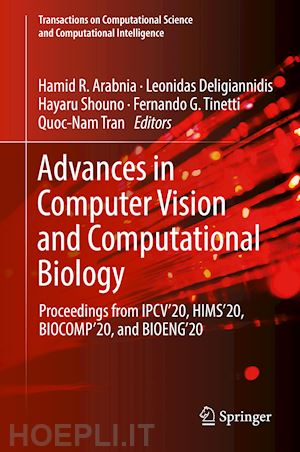

Questo prodotto usufruisce delle SPEDIZIONI GRATIS
selezionando l'opzione Corriere Veloce in fase di ordine.
Pagabile anche con Carta della cultura giovani e del merito, 18App Bonus Cultura e Carta del Docente
The book presents the proceedings of four conferences: The 24th International Conference on Image Processing, Computer Vision, & Pattern Recognition (IPCV'20), The 6th International Conference on Health Informatics and Medical Systems (HIMS'20), The 21st International Conference on Bioinformatics & Computational Biology (BIOCOMP'20), and The 6th International Conference on Biomedical Engineering and Sciences (BIOENG'20). The conferences took place in Las Vegas, NV, USA, July 27-30, 2020, and are part of the larger 2020 World Congress in Computer Science, Computer Engineering, & Applied Computing (CSCE'20), which features 20 major tracks. Authors include academics, researchers, professionals, and students.
Dr. Leonidas Deligiannidis is a Professor of Computer Science at Wentworth Institute of Technology in Boston, MA. His foundation in Computer Science was first established when he earned his B.S. from Northeastern University College of Computer Science. He then went on to obtain two advanced degrees in the field from Tufts University. He has been active in the field since then, investigating subjects like Brain Computer Interfaces, Security, Business-oriented visualizations, and STEM Education. He has also served in industrial positions outside the scope of his academic work, using his acumen for several companies. His industry experience includes both entrepreneur startups in healthcare and high-tech networking companies. He has received multiple awards for his efforts, including multiple Achievement Awards for his contributions to Imaging Science by the World Congress in Computer Science, Computer Engineering, and Applied Computing, IEEE best paper awards, as well as a University Presidential award for his scholarly achievements. In addition, he has served asa referee for many journals in computer science and is a member of the program and organizing committees for notable conferences in his field.
Professor Hayaru Shouno received his Ph.D degree from Osaka University, Japan in 1999. He is a professor of the University of Electro-Communications (Japan) from 2015. His research interests include artificial intelligence, artificial neural networks, and vision. He is the chair of Technical committee of neurocomputing (NC) in the Institute of Electronics, Information and Communication Engineers (IEICE) in Japan.
Fernando G. Tinetti has a PhD in Computer Science and is a Professor at Facultad de Informatica, Universidad Nacional de La Plata, La Plata, Argentina. He is also a researcher of the Comision Investigaciones Cientificas de la Provincia de Buenos Aires, Argentina. He is a recipient of the NSF-TCPP Early Adopter Award, NSF/IEEE-TCPP, Curriculum Initiative on Parallel and Distributed Computing.











Il sito utilizza cookie ed altri strumenti di tracciamento che raccolgono informazioni dal dispositivo dell’utente. Oltre ai cookie tecnici ed analitici aggregati, strettamente necessari per il funzionamento di questo sito web, previo consenso dell’utente possono essere installati cookie di profilazione e marketing e cookie dei social media. Cliccando su “Accetto tutti i cookie” saranno attivate tutte le categorie di cookie. Per accettare solo deterninate categorie di cookie, cliccare invece su “Impostazioni cookie”. Chiudendo il banner o continuando a navigare saranno installati solo cookie tecnici. Per maggiori dettagli, consultare la Cookie Policy.